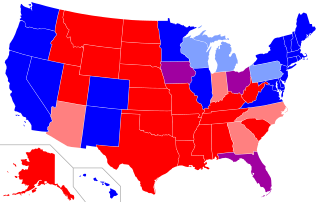Optics Classification and Indexing Scheme (OCIS) is a categorization scheme used to encode the topic of an article or presentation in a 7-digit code. The system is used by the Optical Society of America in the organization of conferences and for journal publications. Authors are required to choose one or several OCIS numbers at submission.

Code-division multiple access (CDMA) is a channel access method used by various radio communication technologies. CDMA is an example of multiple access, where several transmitters can send information simultaneously over a single communication channel. This allows several users to share a band of frequencies. To permit this without undue interference between the users, CDMA employs spread spectrum technology and a special coding scheme.
In digital transmission, the number of bit errors is the number of received bits of a data stream over a communication channel that have been altered due to noise, interference, distortion or bit synchronization errors.
In the field of data compression, Shannon–Fano coding, named after Claude Shannon and Robert Fano, is a name given to two different but related techniques for constructing a prefix code based on a set of symbols and their probabilities.
A language code is a code that assigns letters or numbers as identifiers or classifiers for languages. These codes may be used to organize library collections or presentations of data, to choose the correct localizations and translations in computing, and as a shorthand designation for longer forms of language names.
Constant bitrate (CBR) is a term used in telecommunications, relating to the quality of service. Compare with variable bitrate.

Coding theory is the study of the properties of codes and their respective fitness for specific applications. Codes are used for data compression, cryptography, error detection and correction, data transmission and data storage. Codes are studied by various scientific disciplines—such as information theory, electrical engineering, mathematics, linguistics, and computer science—for the purpose of designing efficient and reliable data transmission methods. This typically involves the removal of redundancy and the correction or detection of errors in the transmitted data.
94 (ninety-four) is the natural number following 93 and preceding 95.

Indian nationality law details the conditions by which a person holds Indian nationality. The two primary pieces of legislation governing these requirements are the Constitution of India and the Citizenship Act, 1955.
Oracle APEX is a proprietary web-based integrated development environment (IDE) developed by Oracle Corporation for creating and managing Oracle databases and other related database functionality. APEX intends to simplify the process of creating web applications that serve as a frontend to a database server, among other things.

Since around the 2000 United States presidential election, red states and blue states have referred to states of the United States whose voters predominantly choose either the Republican Party (red) or Democratic Party (blue) presidential and senatorial candidates. Since then, the use of the term has been expanded to differentiate between states being perceived as liberal and those perceived as conservative. Examining patterns within states reveals that the reversal of the two parties' geographic bases has happened at the state level, but it is more complicated locally, with urban-rural divides associated with many of the largest changes.
The ElGamal signature scheme is a digital signature scheme which is based on the difficulty of computing discrete logarithms. It was described by Taher Elgamal in 1985.
OCI may refer to:

Team GB is the brand name used since 1999 by the British Olympic Association (BOA) for their British Olympic team. The brand was developed after the nation's poor performance in the 1996 Summer Olympics, and is now a trademark of the BOA. It is meant to unify the team as one body, irrespective of each member athlete's particular sport. Officially, the team is the "Great Britain and Northern Ireland Olympic Team", although athletes from Northern Ireland may opt to compete under the auspices of the Olympic Federation of Ireland instead.

Chicken is a programming language, specifically a compiler and interpreter which implement a dialect of the programming language Scheme, and which compiles Scheme source code to standard C. It is mostly R5RS compliant and offers many extensions to the standard. The newer R7RS standard is supported through an extension library. Chicken is free and open-source software available under a BSD license. It is implemented mostly in Scheme, with some parts in C for performance or to make embedding into C programs easier.

A team representing just Ireland has competed at the Summer Olympic Games since 1924, and at the Winter Olympic Games since 1992. The Olympic Federation of Ireland (OFI) was formed in 1922 during the provisional administration prior to the formal establishment of the Irish Free State. The OFI affiliated to the International Olympic Committee (IOC) in time for the Paris games. For many sports, the team represents the entire island of Ireland, which comprises both the Republic of Ireland and Northern Ireland. From the first modern-era games in 1896 until the 1920 games, Ireland was represented by the Great Britain and Ireland team.
The United States Food and Drug Administration (FDA) Office of Criminal Investigations (OCI) was established to provide the FDA with a specific Office to conduct and coordinate Criminal investigations.
Since Ukraine's independence in 1991, the country has used four main systems of vehicle registration plates.
National Pension System Trust is a specialised division of Pension Fund Regulatory and Development Authority which is under the jurisdiction of Ministry of Finance of the Government of India. The National Pension System (NPS) is a voluntary defined contribution pension system in India. National Pension System, like PPF and EPF is an EEE (Exempt-Exempt-Exempt) instrument in India where the entire corpus escapes tax at maturity and entire pension withdrawal amount is tax-free.
In cryptography, post-quantum cryptography refers to cryptographic algorithms that are thought to be secure against a cryptanalytic attack by a quantum computer. As of 2021, this is not true for the most popular public-key algorithms, which can be efficiently broken by a sufficiently strong quantum computer. The problem with currently popular algorithms is that their security relies on one of three hard mathematical problems: the integer factorization problem, the discrete logarithm problem or the elliptic-curve discrete logarithm problem. All of these problems can be easily solved on a sufficiently powerful quantum computer running Shor's algorithm. Even though current, publicly known, experimental quantum computers lack processing power to break any real cryptographic algorithm, many cryptographers are designing new algorithms to prepare for a time when quantum computing becomes a threat. This work has gained greater attention from academics and industry through the PQCrypto conference series since 2006 and more recently by several workshops on Quantum Safe Cryptography hosted by the European Telecommunications Standards Institute (ETSI) and the Institute for Quantum Computing.

Overseas Citizenship of India (OCI) is a form of permanent residency available to people of Indian origin and their spouses which allows them to live and work in India indefinitely. Despite the name, OCI status is not citizenship and does not grant the right to vote in Indian elections or hold public office. The Indian government can revoke OCI status in a wide variety of circumstances. As of 2020, there are 6 million holders of OCI cards among the Indian Overseas diaspora.